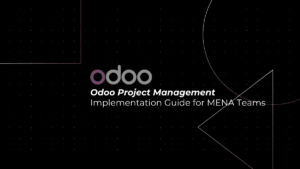Enterprise Resource Planning (ERP) systems are often viewed as the backbone of large corporations, known for their ability to streamline processes and integrate various functions across complex organizations. However, the question arises: Are ERP systems a good fit for small and mid-size enterprises (SMEs)?
This article dives into the world of ERP systems for SMEs, exploring the pros and cons, viable alternatives, and key considerations for making an informed decision.
Table of Contents
ToggleERP 101: Understanding the Powerhouse
An ERP system acts as a central hub, integrating various business functions like accounting, inventory management, customer relationship management (CRM), human resources (HR), and more. This integration offers numerous potential benefits, including:
- Improved data accuracy and accessibility: Real-time data across all departments eliminates the need for manual data entry and reconciliation, minimizing errors and discrepancies.
- Enhanced decision-making: A holistic view of your business operations empowers you to make data-driven decisions with greater confidence.
- Increased efficiency: Streamlined workflows and automated processes can significantly improve operational efficiency, freeing up valuable resources.
- Improved customer service: Integrated customer data fosters a more complete understanding of customer needs and interactions, leading to better customer service experiences.
The Big Question: Is a Full-Blown ERP Right for Your SME?
While the advantages of ERP systems are undeniable, the traditional ERP landscape has been dominated by large, complex, and often expensive solutions designed for enterprise-level businesses. For SMEs, the cost of implementation, ongoing maintenance, and the sheer complexity of these systems can be prohibitive.
This is where the good news comes in. The landscape for SMEs is no longer limited to these behemoths. Here are some key considerations to help you navigate the options available and determine the best fit for your business:
- Cost-Benefit Analysis: Weighing the Numbers
ERP systems are an investment, and for SMEs, a cost-benefit analysis is crucial. The potential benefits of improved efficiency, data accuracy, and streamlined operations need to be weighed against the initial investment and ongoing costs associated with the chosen solution.
Finding the Right Fit: SME-Specific ERP Systems

For SMEs, the market offers a range of ERP systems that are specifically designed to meet their unique needs. These systems tend to be:
- Less Expensive: They are more affordable due to their scaled-down features and functionalities that are tailored to smaller operations.
- Easier to Implement: Their simpler design allows for quicker implementation with less disruption to the business.
- User-Friendly: They often feature more intuitive interfaces suitable for users who may not have specialized IT skills.
Exploring Point Solutions and Best-of-Breed Options
Instead of a full-fledged ERP system, SMEs might consider point solutions or best-of-breed systems that focus on specific areas, such as Customer Relationship Management (CRM) or Human Resources (HR). These solutions can offer several advantages:
- Lower Risk: They involve less commitment in terms of resources and time, reducing the overall risk.
- Focused Functionality: They meet specific needs without the complexity of a full ERP system, making them easier to use and maintain.
- Scalability: Many are scalable, allowing businesses to add more functionalities as they grow.
Leveraging Interoperability and Business Intelligence
For SMEs that already have various systems in place, adopting business intelligence solutions or seeking ERP systems with strong interoperability capabilities can be beneficial. These solutions help businesses integrate and analyze data from existing systems, providing comprehensive insights without the need to replace current systems completely.
Benefits of interoperability include:
- Cost Efficiency: Reduces the need for major system overhauls, utilizing existing IT investments.
- Improved Insights: Enhances the ability to extract and analyze data across different platforms, leading to better strategic decisions.
- Flexibility: Offers the flexibility to integrate with new tools and technologies as they emerge.
Keep reading as we tell you about an ERP system that will ease your SME operations.
Choosing the Right Path: Key Considerations for SMEs
Here are some key questions to ask yourself when navigating the world of ERP solutions for your SME:
What are your biggest pain points? Identify the areas of your business that require the most improvement in terms of efficiency, data accuracy, or integration.
What is your budget? Be realistic about your financial resources and choose a solution that fits comfortably within your budget.
What is your existing IT infrastructure? Consider the systems you already have in place and whether you’d prefer to integrate with them or replace them entirely.
What is your level of technical expertise? Assess your team’s technical capabilities and choose a solution that offers the right level of user-friendliness and support.
What is your growth trajectory? Consider the scalability of the solution. Will it be able to accommodate your business’s growth plans in the future?
Zoho One: A Tailored ERP Solution for SMEs
Zoho One offers a suite of over 45 integrated applications designed to cover virtually every aspect of business management, making it an ideal ERP solution for small and mid-size enterprises (SMEs). This extensive range ensures that businesses can manage all their processes through a single platform, which facilitates seamless information flow between different departments, enhancing coordination and reducing errors.
Key features include:
- Sales and Marketing Tools: Streamline your sales pipelines and marketing campaigns with advanced CRM functionalities.
- Financial Management: Integrated tools for invoicing, accounting, and expense management help keep your finances in check.
- Human Resources: From recruitment to performance management, handle all HR processes with ease.
- Custom Solutions: Use Zoho Creator to build custom apps tailored to specific business needs without extensive coding knowledge.
Beyond the Software: Implementation and Change Management
Remember, a successful ERP or alternative solution implementation goes beyond just choosing the right software. Change management is crucial for user adoption and ensuring a smooth transition. Here are some additional tips:
Invest in training: Ensure your team is properly trained on the new system to maximize its potential.
Foster open communication: Keep your team informed throughout the implementation process and address any concerns they may have.
Start small and scale gradually: Don’t try to implement everything at once. Begin with a phased approach, focusing on the most critical areas first.
Seek professional guidance: Consider partnering with an ERP implementation consultant or a managed service provider (MSP) with expertise in SME solutions. Their experience can help navigate the selection process, ensure a smooth implementation, and provide ongoing support.
The Final Word: Embrace Continuous Improvement
The world of technology is constantly evolving, and your business needs will evolve alongside it. Don’t view your ERP or chosen alternative solution as a one-time fix. Regularly evaluate your systems and processes to identify areas for improvement. New technologies and solutions may emerge that better suit your evolving needs. By fostering a culture of continuous improvement and staying informed about the evolving landscape, you can ensure your business remains efficient and adaptable in the long run.
SMEs don’t have to be intimidated by complex ERP systems. By understanding the core functionalities and the limitations of traditional ERP solutions, SMEs can explore various alternatives like SME-specific ERP or point solutions. Carefully consider your budget, existing systems, and growth plans to choose the best fit. Remember, successful implementation involves user training, change management, and continuous improvement. This approach empowers SMEs to leverage technology for streamlined operations, valuable insights, and overall business growth.




